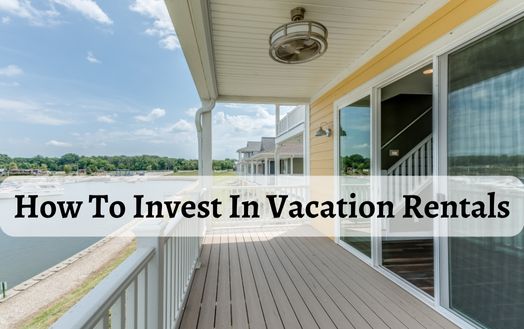How To Invest In Vacation Rentals
Are you tired of the same old investment options? Looking for something new and exciting to diversify your portfolio? Well, look no further because I have just the thing for you – investing in vacation rentals!
In this article, I will guide you through the ins and outs of this innovative investment strategy on how to invest in vacation rentals that is sure to satisfy your subconscious desire for innovation. Imagine owning a property in a beautiful location that not only brings in steady income but also allows you to enjoy your own vacations. That’s exactly what investing in vacation rentals offers.
With this unique investment opportunity, you can tap into the booming tourism industry while experiencing the thrill of being an entrepreneur. So whether you’re a seasoned investor looking for a fresh challenge or someone who simply wants to make their money work harder, investing in vacation rentals could be just the ticket to fulfill your subconscious desire for innovation.
How To Invest In Vacation Rentals
Vacation rentals are a great way to make money and enjoy a vacation home. Recently, more travelers are renting vacation homes instead of hotels. Investors can earn passive income and take a vacation.
How do you invest in vacation rentals?
First, evaluate locations for high demand. Find areas with year-round tourism or unique attractions. Consider accessibility, nearby amenities, and short-term rental regulations.
Budget and finance come next. Vacation rentals can be costly, so it’s important to determine how much you can invest without risking your finances. You may need a mortgage or investors.
After finding the right location and securing financing, buy your vacation rental. Hire an investment property real estate agent for advice and price negotiation. Look for guest-friendly features like spacious living areas, modern amenities, and appealing outdoor spaces when choosing a property.
Vacation rentals are a great way to make money and enjoy vacation home ownership. You can succeed in this lucrative market by researching locations, financing options, and buying the right property.
Rental Property Basics

Learn property management basics to start renting. Vacation rentals can be profitable investments if planned and executed properly.
Location matters. A high-demand vacation destination will guarantee renters and maximize your return on investment. To avoid legal issues, learn about local vacation rental laws. After finding the perfect rental property location, consider investing. Set a budget for buying or renovating the property. It’s important to invest enough to attract renters without overspending.
Rent collection is only part of property management. You’ll manage maintenance, repairs, marketing, and tenant issues. If you prefer to delegate, a good property management company can help.
Before investing in rental properties, learn the basics. You’ll succeed in this venture by choosing an attractive vacation rental location, carefully considering your budget, and being prepared for property management.
Let’s examine some effective vacation rental investment strategies that can maximize returns and minimize risks. Vacation rental location research is a good investment strategy. Look for tourist-friendly areas with strong rental markets. This will increase bookings and rental rates, maximizing your profits.
Investment Strategies
To maximize vacation property returns, research and choose a location that attracts high-demand tourists and offers appealing amenities. Successful vacation rental investments require popular tourist destinations with a strong rental market.
Find places with lots of year-round visitors to ensure a steady stream of renters. Focus on locations with unique attractions or experiences to set your vacation rental apart. Selecting the right vacation rental property is also crucial. Condos and beachfront villas can be profitable alternatives to houses. These properties have lower maintenance costs and attract more travelers. By offering a variety of vacation rentals, you can attract more guests year-round.
Vacation rental property investors must also carefully assess rental income. Research nearby comparable properties’ average occupancy rates and rental prices. This will help you estimate investment property income. Seasonality and local events may impact demand and pricing.
Vacation rental investing can be successful if you strategically choose a location, property types, and rental income. Understanding what draws tourists to certain areas and offering unique experiences through your rental properties is key.
Calculating Potential Income

Accurately forecast your dream vacation property investment’s income to maximize returns and satisfaction. Calculating vacation rental income is essential for informed decision-making. If your rental property’s income meets your financial goals, you’ll know.
Start by researching average rental rates in your investment area to estimate vacation rental income. To determine guests’ prices, compare similar properties’ rates. Also, consider seasonal demand. Understanding peak and off-peak times helps you estimate occupancy rates and adjust prices.
Consider vacation rental expenses. Mortgage payments, property taxes, insurance, utilities, maintenance, and property management fees if you hire one To calculate net profit, subtract these expenses from projected rental income. These costs can significantly affect your ROI, so be realistic.
The vacancy rate affects potential income. For accurate forecasting, estimate how often your vacation rental will be empty. Consider local competition and events that may draw or deter guests. You’ll have a better idea of your vacation rental investment’s profitability if you research and analyze expenses, market factors, and the vacancy rate.
In the next section, we’ll discuss other important factors to consider before investing in a vacation rental, helping you make smart decisions and maximize returns on this exciting venture.
Factors To Consider
Market factors affect your income potential. Vacation rental investments depend on location. Popular tourist destinations have higher rental and occupancy rates for vacation rentals. Thus, it’s crucial to research and analyze locations to find high-income areas.
Location competition is another factor. You can determine how easily you can attract guests and keep bookings by assessing the saturation of the vacation rental market. If there are many similar rental properties, it may be hard to stand out and make money. However, if you find an area with low competition and high demand, you can make good money.
Income potential also depends on local regulations. Some cities or neighborhoods require short-term rental permits or licenses. These regulations can lead to fines or property closures. Before investing, check the local laws.
As I discuss “choosing the right property,” these market factors are crucial in the early stages of vacation rental investing. By analyzing location, competition, and local regulations, you can invest your money for maximum profit.
Choosing The Right Property

After considering location, demand, and regulations, it’s time to choose a property. This step will determine your return on investment and business success. Finding the right vacation rental property is like discovering a treasure for an investor.
Consider several factors when choosing a vacation rental property. First, consider location and guest appeal. Is it near tourist attractions or tucked away? Second, is the property large enough for guests to stay comfortably? Assess any unique features or amenities that could make your property stand out. These elements help attract and retain guests.
When choosing a vacation rental investment property, market trends are crucial. Use historical data and current demand patterns to find growth areas. Look for emerging destinations with low prices but untapped tourism potential. You can lead this booming industry by investing wisely and being ahead of the curve.
With these factors in mind, assess properties for investment potential. Always consider your ROI and long-term goals when making decisions. The right property can generate income and give tourists unforgettable experiences.
Managing expenses is the next step in our vacation rental investing journey. We can maximize profitability without sacrificing guest satisfaction or quality by controlling costs and optimizing property revenue streams.
Managing Expenses
To manage expenses in your vacation rental business, you must track and optimize spending while ensuring guest satisfaction and product quality. Maintaining, repairing, and marketing your vacation rental property requires awareness of all costs. Optimizing expenses can boost rental revenue and ROI.
Start with a detailed vacation rental budget. This will help you cut costs without affecting guest satisfaction. Consider property taxes, insurance premiums, cleaning fees, and any other services you offer. Knowing these expenses upfront lets you set prices and ensure rental revenue covers them.
Use technology to simplify expense management. Real-time accounting software or mobile apps can track income and expenses. These tools can reveal financial trends and help you optimize costs. To save time and reduce errors, automate booking confirmations and utility bill payments.
Managing costs and guest satisfaction requires careful expense tracking and prioritization. Happy guests leave positive reviews and recommend your vacation rental, increasing occupancy and rental revenue. Give priority to customer service, cleanliness, and problem-solving. Investing in guest satisfaction upfront can generate positive word-of-mouth advertising and increase bookings.
Tracking and optimizing expenses in your vacation rental business can help you stay profitable and provide great service.
Maximizing Rental Income

After managing expenses, let’s maximize rental income by learning more on how to invest in vacation rentals. Who wouldn’t maximize their investment?
There are several ways to boost vacation rental income in a competitive market. Understand the local rental market first. This involves examining nearby properties’ pricing, amenities, and occupancy rates. You can learn what guests want and tailor your vacation rental accordingly. Unique amenities can help your property attract more guests and charge higher rates.
Effective marketing helps maximize rental income. Today, a strong online presence is crucial. Showcase your property on Airbnb, HomeAway, or VRBO with high-quality photos and descriptions. To immerse guests, consider professional photography or virtual tours.
Demand and seasonality must be monitored and adjusted to your pricing strategy. Demand may allow you to charge more during peak travel seasons or local events. During slow periods, discounted rates or deals can boost occupancy.
Understanding your local rental market, effective marketing, and smart pricing based on demand fluctuations are needed to maximize vacation rental income. These strategies will boost guest numbers and investment property profits.
As we discuss vacation rental investments, we must understand market demand trends.
Understanding Demand
I can tailor an unforgettable experience for guests by tapping into the pulse of popular destinations. Vacation rental investors must understand demand.
I can find popular tourist destinations by studying tourist trends. Visitor statistics and tourism reports can reveal demand. These reveal hot destinations. Instagram and travel blogs can also reveal vacation destinations. I can tailor my investment strategy to potential guests by following these trends.
Understanding demand also means understanding visitors’ needs and preferences. Families may seek vacation rentals near family-friendly attractions or with kid-friendly amenities. Solo or couple travelers may prefer nightlife or cultural attractions. Understanding these nuances allows me to meet the needs of different guests at my rental properties.
I can strategically position myself in the vacation rental market by monitoring demand and knowing what draws people to certain areas. I can invest wisely and design my properties to maximize appeal with this knowledge. My knowledge of demand will help me succeed in this competitive industry.
Vacation rental investing requires understanding demand. I can create an unforgettable experience for guests by knowing tourist hotspots and what they want from their accommodations.
With this knowledge, let’s examine how VRBO and other platforms help property owners connect with eager travelers seeking unique experiences around the world.
VRBO And Other Platforms

VRBO and other platforms connect property owners with adventurous travelers. These vacation rental platforms have changed how people plan their vacations by making it easier to find the right accommodation.
Here are three reasons why VRBO and similar platforms have become indispensable tools for both property owners and vacationers:
- Wide Selection: VRBO boasts an extensive database of vacation rentals, ranging from cozy cabins nestled in serene forests to luxurious beachfront villas with breathtaking ocean views. With just a few clicks, travelers can browse through countless options and find the ideal home away from home that suits their preferences and budget.
- User Reviews: One of the most valuable features offered by these platforms is the ability to read reviews left by previous guests. This allows potential renters to gain insights into the quality of properties and the experiences others have had while staying there. By taking advantage of this information, travelers can make informed decisions about where to stay and avoid any unpleasant surprises.
- Direct Communication: Vacation rental platforms facilitate direct communication between property owners and travelers, eliminating intermediaries or agents who often add unnecessary fees or complications. This direct line of contact enables potential renters to inquire about specific amenities, negotiate prices if necessary, or simply get a better feel for what awaits them at their chosen destination.
Vacation rental investing has never been easier or more fun, thanks to VRBO and other platforms. Before diving into this venture, legal and financial considerations are necessary to ensure success.
Let’s discuss vacation rental legalities like local regulations and tax obligations and financial aspects like initial investment costs and projected returns on investment. These factors are essential for vacation rental success.
Legal And Financial Considerations
Consider the legal and financial implications of vacation rental investments. Vacation rentals can generate passive income, but legal issues must be considered.
First, study local short-term rental laws. Some cities restrict vacation rentals or require permits. These regulations can lead to fines or the closure of your rental property.
Before investing, carefully analyze your finances. Set a budget to determine how much you can spend on a vacation rental property. Consider property taxes, insurance, maintenance, and marketing costs. Occupancy rates, rental prices, and seasonal fluctuations should be used to calculate your expected return on investment (ROI).
Before starting your vacation rental business, consider factors beyond legal and financial ones. Consider hiring a property management company or managing it yourself. Self-management saves money but requires time and expertise in marketing, guest communication, cleaning coordination, and maintenance troubleshooting.
Before investing in vacation rentals, learn about the legal and financial issues. Check local short-term rental regulations and obtain any necessary permits or licenses. Consider all vacation rental property expenses when calculating your budget and ROI. After considering these important factors and others, like managing the property or hiring professionals, you’ll be ready for success in this exciting venture.
Let’s look at some ways to manage your vacation rental property seamlessly.
Property Management Options

You can relax while a professional management company handles guest communication and cleaning coordination for your vacation rental property. Vacation rental property management keeps your property well-maintained and profitable.
A reputable property management company can market your rental, handle bookings, and ensure a smooth guest experience. Vacation rental companies can manage properties. These companies know the local market and have local vendors and service providers. They can manage your rental’s advertising, check-ins, and repairs. Their industry expertise can help you set competitive rental rates to maximize profits.
Work with an online vacation rental property management platform. These platforms manage bookings, guest communications, and cleaning services. Dynamic pricing algorithms adjust rental rates based on demand on some platforms. This innovative approach lets you automate many vacation rental management tasks while still making important decisions.
Check fees and services before choosing a vacation rental property management company. Consider their history of maximizing occupancy and guest satisfaction. Reading homeowner reviews can also reveal their reliability and professionalism.
You can find a vacation rental property management solution that meets your needs by comparing options. After making this decision, focus on investing in this lucrative market segment immediately!
Tips For Success
Use these vacation rental success tips to succeed. Vacation rentals can be profitable if planned and executed properly.
First, choose a good investment location. Consider attractions, amenities, and local laws when researching popular vacation destinations. Selecting a desirable location boosts guest numbers and rental income.
Next, prioritize guest satisfaction. From comfy furniture to well-equipped kitchens and Wi-Fi to pools, pay attention to every detail. Customer service matters too. Respond quickly, resolve issues, and exceed expectations. Guest satisfaction leads to positive reviews and referrals.
Vacation rentals require effective marketing. Use Airbnb or VRBO to advertise your property’s unique features. Use beautiful photos, compelling descriptions, and accurate pricing to market your rental. Consider professional photography or virtual tours to make your listing stand out.
Finally, success in this industry requires ongoing learning. Read industry blogs or attend property management or hospitality conferences to learn about vacation rental market trends. Guest feedback and market conditions should drive strategy changes.
These vacation rental tips will help you succeed! However, it’s important to consider the risks of managing properties remotely or dealing with difficult guests, which we’ll discuss next.
Potential Pitfalls

After discussing vacation rental property investment tips, it’s important to know the potential pitfalls. This investment has its pros and cons. It’s crucial to proceed cautiously and understand the risks.
Vacation rental investment risks include market volatility. Seasonality, the economy, and even natural disasters and pandemics can affect vacation rental demand. This could lower your rental income because your property may not be booked year-round.
Vacation rental management is another issue. You or a property management company must maintain the property, unlike traditional long-term rentals. Cleaning between guests, fixing problems quickly, and ensuring a smooth check-in and check-out are examples. Negative reviews and fewer bookings can result from mismanagement.
Vacation rentals involve legal and regulatory issues. Short-term rentals may be prohibited by zoning or homeowner association rules. Before buying a home, learn local laws to avoid legal issues. Your location may require permits or licenses.
Vacation rental properties can be lucrative, but there are risks. This venture requires careful consideration of market fluctuations, maintenance issues, and legal issues. Being prepared and proactive in addressing these challenges can improve your chances of success in this exciting investment opportunity.
Before we discuss long-term vs. short-term investment strategies, consider how these potential pitfalls affect your decision-making.
Long-Term Vs Short-Term Investment
Understand how investment duration affects returns and involvement when choosing a long-term or short-term strategy. Vacation rental long-term and short-term investments have pros and cons.
Vacation rentals for a year or more are long-term investments. Long-term leases provide stability and income. It reduces turnover and marketing. It also limits personal use and market-driven rental rate increases.
Short-term vacation rental investments focus on nightly or weekly rentals. This lets you charge more during peak seasons and capitalize on tourist demand. It also lets you use the property whenever you want. However, managing short-term rentals requires more active involvement, including bookings, cleaning between guests, and resolving issues.
Investing in vacation rentals, long-term or short-term, depends on your goals and preferences. A long-term approach may work for you if you value stability over flexibility. If you value rental income and are willing to manage guests, a short-term strategy may be better.
Long-term and short-term vacation rental investments have pros and cons. Knowing your investment goals helps you choose a strategy. Whether stability or maximum rental income drive your decision, carefully weighing these factors will help you make an informed choice that meets your financial goals and ensures a satisfying vacation rental experience.
Final Thoughts
Vacation rentals are a lucrative investment. Investors can maximize income by understanding rental properties and using effective investment strategies on how to invest in vacation rentals .
Location, market demand, and rental rates must be considered when estimating a property’s income. Success requires choosing the right property management option. Proper management ensures guest satisfaction and property upkeep, whether self-managed or managed by a professional. Finally, beware of seasonality and market fluctuations.
Your goals and preferences determine whether you invest in vacation rentals for short-term or long-term gains. Vacation rentals can provide financial stability and an enjoyable entrepreneurial journey with careful planning and execution.
Frequently Asked Questions
What Are The Tax Implications Of Investing In Vacation Rentals?
Vacation rentals have significant tax implications. Investors must understand rental income taxes. Rental income may be taxable. Local or transient occupancy taxes may also apply, depending on your location.
Mortgage interest, property management fees, and maintenance can reduce taxes. To maximize deductions and comply with tax laws, consult a real estate investment tax professional.
Staying informed about tax implications and seeking expert advice can help you make smarter investment decisions and possibly reduce your tax liability while enjoying the benefits of vacation rental investing.
How Can I Ensure The Safety And Security Of My Vacation Rental Property?
I must protect my vacation rental property. I prioritize cutting-edge technology solutions to do this. I install smart locks that can be controlled via a mobile app for convenience and security.
I also installed a security system with strategically placed surveillance cameras to deter intruders. Advanced motion sensors in these cameras send real-time alerts to my phone, allowing me to act quickly.
I also use home automation systems to remotely control lights, thermostats, and blinds to make the property appear occupied. I can confidently offer my guests a worry-free experience and protect my vacation rental investment by adopting these innovative safety and security measures.
Are There Any Specific Regulations Or Permits Required For Operating A Vacation Rental?
Vacation rentals require permits and regulations. Zoning laws may limit guest numbers, noise levels, parking, and safety measures like fire extinguishers and smoke detectors. Avoid fines and legal issues by researching and following these regulations. Some cities require short-term rental permits. I can keep my vacation rental safe and legal by staying up-to-date on local regulations and obtaining permits.
What Are The Pros And Cons Of Investing In Vacation Rentals In Popular Tourist Destinations Versus Less Crowded Areas?
Vacation rentals in tourist hotspots have pros and cons. On the plus side, these areas draw tourists year-round, making accommodations in demand. This means you can earn significant rental income and quickly recoup your investment.
Popular tourist destinations often have many amenities and attractions, making your vacation rental more appealing to guests. There are drawbacks. In crowded areas, vacation rentals compete for bookings, making it hard to stand out. Popular tourist destinations have higher property prices than less crowded areas, so your initial investment may be higher.
High tourist volumes can also increase maintenance costs and property wear. Your risk tolerance and investment goals will determine whether you invest in vacation rentals in popular tourist destinations or less crowded areas.
As an investor, you must weigh the pros and cons of each option and match them to your goals.
How Can I Effectively Market And Advertise My Vacation Rental Property To Attract More Guests?
I use traditional and cutting-edge methods to market and advertise my vacation rental property and attract more guests.
First, I create a compelling online presence by showcasing stunning photos of the property, highlighting unique features, and providing detailed descriptions that captivate potential guests. I also use social media to interact with travelers and promote local attractions near my rental. I also use cutting-edge technology like virtual tours and 360-degree videos to show potential guests the property from anywhere in the world. I attract more guests seeking an unforgettable experience by constantly finding new ways to grab my target audience’s attention.











